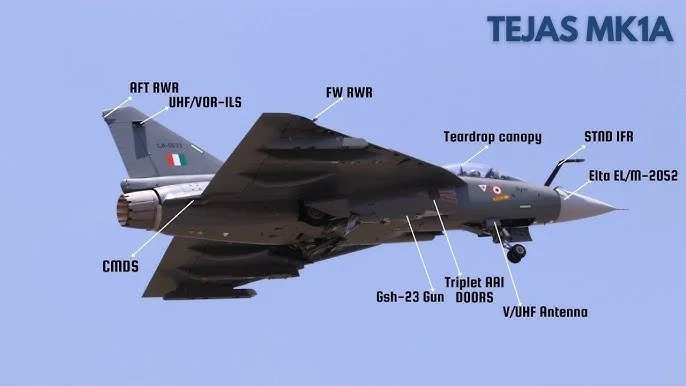
Follow WOWNEWS 24x7 on:

In a landmark move to strengthen India’s aerial combat and surveillance capabilities, the Cabinet Committee on Security (CCS), chaired by Prime Minister Narendra Modi, has approved the acquisition of 97 Tejas Mark-1A fighter jets and six advanced Airborne Early Warning and Control (AEW&C) aircraft. The combined deal, valued at approximately ₹85,500 crore, marks one of the largest indigenous defence procurements in recent years and responds to the growing collusive threat from China and Pakistan.
1. Tejas Mark-1A Fighter Jet Expansion
- CCS has sanctioned ₹66,500 crore for the procurement of 97 improved Tejas Mark-1A jets from Hindustan Aeronautics Limited (HAL), adding to the 83 jets already ordered in 2021 under a ₹46,898 crore deal
- With this new order, the Indian Air Force (IAF) will operate a total of 180 Tejas Mark-1A jets, significantly strengthening its light combat aircraft fleet
- HAL will scale up production to 20 jets per year initially, with plans to increase output to 24–30 jets annually. A third production line in Nashik is now operational
- The Tejas Mark-1A features upgraded avionics, radar systems, and weapons integration, including Astra air-to-air missiles. Final weapons trials are scheduled for September
- This acquisition is critical to offset the retirement of 36 aging MiG-21 jets, which will reduce IAF’s squadron strength to 29—well below the sanctioned 42.5 squadrons
2. AEW&C Aircraft: Eyes in the Sky
- CCS approved ₹19,000 crore for six AEW&C aircraft, which will be developed by mounting advanced radar and electronic intelligence systems on second-hand Airbus A321 aircraft acquired from Air India
- These aircraft will be modified in Spain and equipped with both dorsal and nose-mounted antennas, offering 300-degree radar coverage—an upgrade from the current 240-degree coverage of Netra AEW&C systems
- Delivery of all six AEW&C aircraft is expected by 2033–34, significantly enhancing India’s surveillance and air combat coordination capabilities
- Currently, the IAF operates only three Netra AEW&C aircraft (based on Embraer-145 jets) and three Israeli Phalcon systems mounted on IL-76 platforms. This limited fleet lags behind even Pakistan in airborne early warning capabilities
- A separate project for six Netra Mark-1A aircraft with upgraded tech has also received initial approval
3. Strategic Context and Regional Dynamics
- The decision comes amid rising concerns over China’s and Pakistan’s growing air power. Pakistan is expected to receive 40 J-35A fifth-generation stealth fighters from China, while China already possesses over four times the number of combat aircraft and force multipliers compared to India
- The Tejas and AEW&C acquisitions are designed to counter this imbalance and ensure India’s preparedness for future aerial conflicts and border surveillance
- The move also aligns with the Make in India and Atmanirbhar Bharat initiatives, promoting domestic defence manufacturing and reducing reliance on foreign suppliers
4. Industrial and Economic Impact
- The Tejas program is expected to benefit hundreds of small and medium enterprises (SMEs) across India, creating jobs and strengthening the defence ecosystem
- HAL’s ramped-up production will stabilize supply chains and improve delivery timelines, addressing past delays that drew criticism from IAF leadership
- Indigenous content in the Tejas Mark-1A exceeds 65 percent, showcasing India’s growing self-reliance in aerospace technology
5. What Lies Ahead
- The first two jets from the earlier batch of 83 Tejas Mark-1A are ready, with full-scale deliveries expected to begin in 2028 and conclude by 2031
- The AEW&C aircraft will be phased in over the next decade, with integration and testing milestones planned across multiple stages
- HAL is also preparing for future orders of Tejas Mark-2 and the fifth-generation Advanced Medium Combat Aircraft (AMCA), further expanding India’s indigenous air combat capabilities
Sources: Times of India, MSN India, Zee News, ET Now




